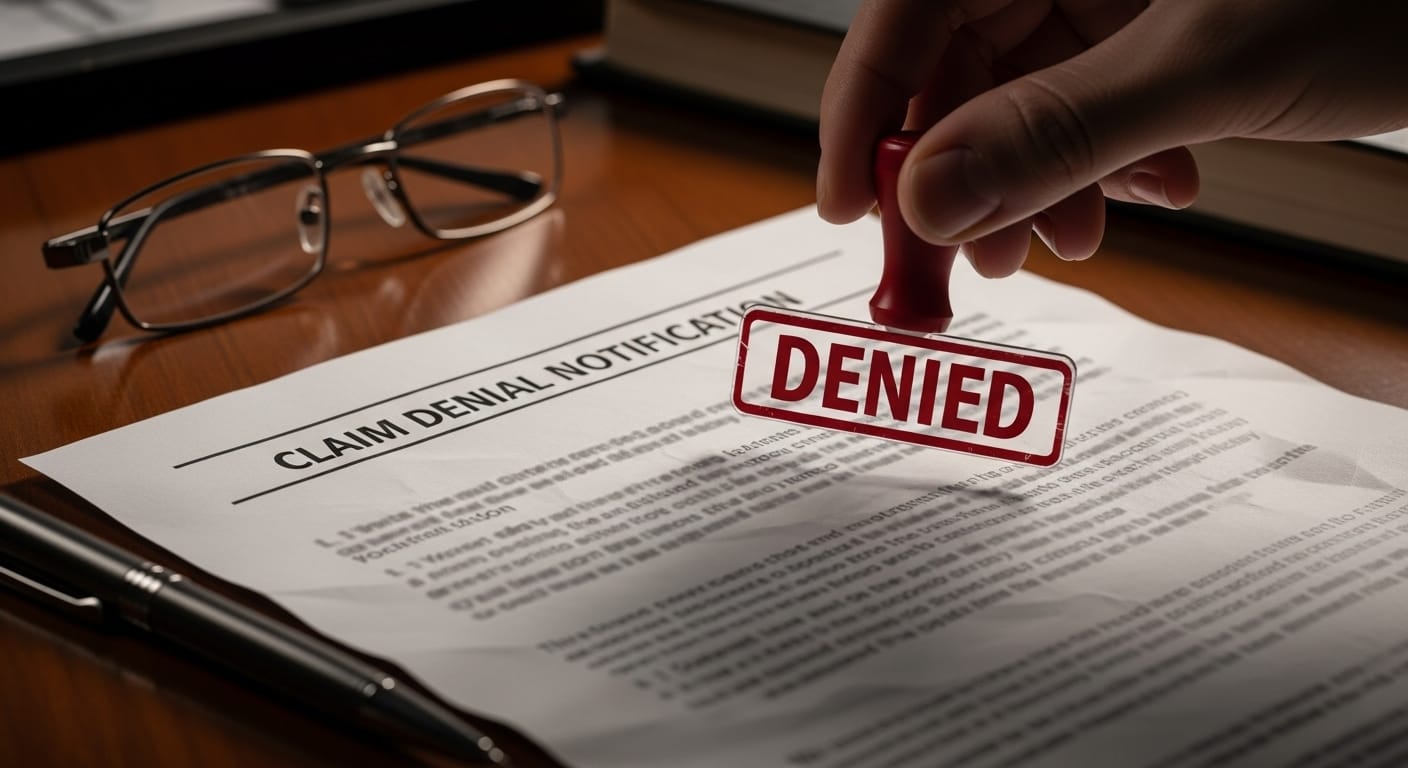Imagine this: You’ve just lost a loved one, you’re trying to get things together in the midst of grief, and then the insurance company comes along with a gut-punch—their answer to your life insurance claim is a big, fat “no.”
It’s like finding out your inheritance is a pile of paperwork instead of the vacation home you imagined. So, what do you do now? Cry into your pillow? Throw your hands up and give up on life insurance forever?
Actually, don’t do either of those things—because, believe it or not, all hope is not lost. If your life insurance claim is denied, you’ve still got some tricks up your sleeve. Let’s dive in.

Top Takeaways and Key Concepts
Read the Denial Letter Carefully: Understand the exact reason for the claim denial before taking further steps.
Know Your Policy Thoroughly: Review all terms, exclusions, and coverage to identify potential errors or misunderstandings.
Request Clarification: Contact the insurer politely to get specific details and correct any mistakes.
Gather Evidence and Appeal: Collect documentation, expert opinions, and medical records to support a formal appeal.
Seek Legal Help if Needed: Hire a life insurance lawyer if the claim remains denied after appeals.
Summary of This Article
Please Note: This post may contain affiliate links. If you click one of them, we may receive a commission at no extra cost to you. As an Amazon Associate, I earn from qualifying purchases.
The article guides readers on what to do if a life insurance claim is denied. Key steps include carefully reading the denial letter, understanding the policy’s terms and exclusions, and asking the insurer for clarification. If the denial appears unjustified, gathering supporting evidence and filing an appeal can improve the chances of success. In complex or contentious cases, consulting a specialized lawyer ensures proper advocacy and increases the likelihood of overturning the denial. Persistence and thorough preparation are essential to securing rightful benefits for loved ones.
Stay Calm and Read the Denial Letter Carefully

I know, I know—it’s hard to read something like a denial letter with a straight face. It’s like getting a rejection letter from a college you didn’t apply to. But you’ve got to do it.
The first thing you need to do is read that letter, and I mean read it carefully, without throwing it across the room in frustration. The insurance company isn’t just rejecting your claim for fun—they’ll tell you exactly why they did it.
The letter might say something like “policy lapsed” or “cause of death not covered.” These reasons will give you a clue about whether the denial was due to something simple that you can fix, or if you’re going to have to roll up your sleeves and get legal.
Whatever the reason, don’t skip this step—it’s the foundation for your next move. The last thing you want is to miss an important detail that could turn the case in your favor.
Know Your Policy Inside and Out
This might seem like a no-brainer, but trust me, a lot of people don’t know what’s actually in their life insurance policy until they need it. Now, don’t panic—your policy is likely buried somewhere in a pile of important papers or digital files.
It’s time to dust it off and see what you’re working with. Why? Because a well-crafted policy is your best friend when it comes to fighting back against a denial.
Take a good look at the exclusions and terms to see if the denial even makes sense. Maybe it was a technicality that could have been avoided, like forgetting to pay the premium, or perhaps a clause that wasn’t explained to you when you signed up. Understanding your policy’s ins and outs is your first line of defense. If you find a glaring contradiction, hold onto that like a golden ticket.
Ask for Clarification
If the denial doesn’t make sense to you, don’t just assume the insurance company is right and give up. That’s where most people make the mistake. Insurance companies are like those vending machines that eat your dollar—sometimes they just need a little shake to get things working. Call the claims department and ask for clarification on why your claim was denied.
It’s important to stay calm on the phone, but don’t let them off the hook too easily. Politely ask for specific details, like what exact part of your claim was problematic. You might get a more detailed explanation or discover that there’s a mistake they can fix.
Of course, this doesn’t guarantee the denial will be overturned, but it’s better than letting it sit there and hoping for the best. And remember, always get the name of the person you speak with and note the time of the conversation.
Review the Cause of Death or Incident
Now, the thing that could make or break your claim is whether the cause of death or incident falls within your coverage. If the cause of death is anything other than natural, accidental, or explicitly covered by your policy, well, this could be a stumbling block.
But all things considered, don’t automatically assume the insurance company is correct about what’s covered. They’re not always as thorough as they should be when reviewing a claim.
For example, let’s say the cause of death was a drug overdose. Some policies won’t cover that. However, if you can prove that the overdose was due to an error in prescribed medication, you might have a case to argue.
This is where legal advice or documentation from a doctor could come in handy. If the cause of death falls into a gray area, you can still challenge the decision.
Appeal the Denial
Insurance companies are not immune to mistakes. You’d be surprised how often a claim gets denied simply because of an oversight. But here’s the good news—most insurance companies allow you to file an appeal. That’s your chance to gather all the evidence and documentation you can muster and show them where they went wrong.
Honestly, this is your time to shine. You’ve got your policy, medical records, expert statements, and anything else you can use to prove that the denial was unwarranted. Some companies make the appeals process complicated on purpose, hoping you’ll give up. But don’t let them win. If you’ve got a solid case, appeal the decision and keep fighting.
Gather Evidence and Seek Expert Help
If you’re facing a denied claim, this might be the moment to pull out the big guns—documentation and expert help. The more evidence you have, the better your chances of winning. This could include a letter from your doctor, expert opinions, or even witnesses who can vouch for your case.
Let’s say, for instance, your claim was denied because the insurance company claims the cause of death wasn’t covered. If you can get a medical expert to testify that the cause of death was misinterpreted, you might have a shot at winning the appeal.
Seek Legal Help if Necessary
Here’s the thing: If the insurance company still isn’t playing fair after you’ve appealed, it might be time to get a lawyer involved. Don’t wait until you’re at your wit’s end—if you’ve got a legitimate case, a lawyer can help you navigate the next steps, and sometimes even take the fight to court if necessary.
Sure, lawyers cost money, but when you’re dealing with a life insurance claim that could provide crucial financial support for your family, it might be worth the investment.
A lawyer specializing in life insurance claims can help you understand your rights, gather evidence, and present a case that might sway the insurance company into changing their decision. After all, they don’t call it “insurance” because it’s guaranteed to work out in your favor.
Stay Persistent and Don’t Give Up
At the end of the day, the best advice I can give you is to be persistent. Insurance companies might try to throw roadblocks in your path, but if you keep pushing, the chances of getting a positive outcome increase. If you’ve done your homework, gathered your evidence, and stayed calm through the whole ordeal, you’re already ahead of the game.
Remember, your fight isn’t just about getting a payout—it’s about making sure your loved ones are taken care of when you’re no longer around. That’s something worth fighting for.
Resources
How to Appeal a Denied Life Insurance Claim
https://www.nolo.com/legal-encyclopedia/how-appeal-denied-life-insurance-claim.html
Understanding Life Insurance Denials
https://www.nerdwallet.com/article/insurance/life-insurance-denial
Life Insurance Claims: What to Do if Your Claim Is Denied
https://www.policygenius.com/life-insurance/claim-denied/
Frequently Asked Questions
Why would a life insurance claim be denied?
Common reasons include policy lapses, missed premium payments, exclusions for certain causes of death, or incomplete claim documentation.
What should I do first if my life insurance claim is denied?
Carefully read the denial letter to understand the exact reason for the denial before taking any next steps or filing an appeal.
Can I ask the insurance company to explain the denial?
Yes. Contact the insurer’s claims department politely and request specific details about the denial to clarify any errors or misunderstandings.
How can I strengthen my appeal after a denial?
Gather all relevant documents, such as medical records, expert opinions, and policy details, to provide strong evidence supporting your case.
What if the insurer claims the cause of death isn’t covered?
Review the policy terms and seek professional opinions to determine if the insurer’s interpretation is accurate or if there’s room for dispute.
When should I consider hiring a lawyer for a denied claim?
If your appeal is unsuccessful or the insurer refuses to reconsider, a lawyer specializing in life insurance claims can guide you through legal options.
Can persistence make a difference in a denied claim?
Yes. Staying organized, calm, and determined throughout the appeals process can significantly improve your chances of a favorable outcome.

Kevin Collier is a legal expert passionate about simplifying complex legal concepts for everyday individuals. With a focus on providing clear, practical information, he covers a wide range of topics, including rights, responsibilities, and legal procedures. Kevin aims to empower readers with the knowledge they need to navigate the legal landscape confidently, ensuring they can make informed decisions regarding their legal matters. Through insightful articles and easy-to-understand resources, he helps demystify the law, making it accessible to all.










